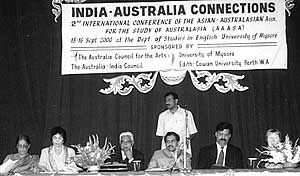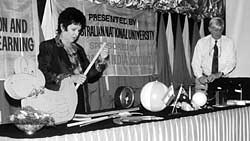During 2000–01, the Council decided to merge the former Australian studies, Indian studies and education programs into a single high-priority education program. The objectives of the education program are to increase knowledge and understanding in Australia of India, and in India of Australia, through the education sectors in each country.
One of the AIC's longest-running collaborations, the Australia–India teacher exchange program managed by the Asia Education Foundation, is designed to give Australian teachers and educational administrators a working familiarity with India while providing Indian teachers and administrators with a better understanding of Australia, thereby advancing the objectives of the Council's education program, including Australian studies and Indian studies.
Seventeen Australian teachers travelled to India during January 2001 to work in a wide range of schools in New Delhi, and fourteen Indian teachers visited Australia during June 2001 to work in schools across Australia. The exchanges provided participants with experience of many aspects of life in each other's countries, including periods of home-stay as well as educational experience and some sightseeing.
| The Council provided funding for the conference of the Asia–Australasia Association for the Study of Australasia (AAASA), held at the University of Mysore in September 2000. The conference attracted a wide range of participants from both India and Australia, including (from left) Dr KT Sunitha of the University of Mysore, Dr Suman Bala (Asian President of AAASA), Dr Cynthia vanden Driesen of Edith Cowan University, Perth (Australian President of AAASA), Professor HK Gowda, Dr Parameswar (Karnataka State Minister for Higher Education), Professor Hegde (Vice Chancellor of the University of Mysore), and the late Professor Anna Rutherford, a prominent and longstanding supporter of Australian studies in India. (Photo: Dr vanden Driesen) |
These visits attracted widespread positive news media coverage, especially in India. Australian participants advised that their visits to India and the visits of the Indian teachers to Australia have been highly effective in developing greater understanding in Australia of India. An Indian teacher reported to the Indian news media that the exchange had provided 'an insight into the vibrant and varied culture of Australia'. Another Indian participant advised that the exchange had helped her to realise that 'Australia is a very desirable alternative to the USA for educational excellence and opportunity'.
| Internationally respected science educators Dr Michael Gore of the National Science and Technology Centre (Questacon) (right) and Dr Susan Stocklmayer, Director of the Centre for Public Awareness at the Australian National University, demonstrate innovative science education techniques at workshops in Chennai during November 2000. (Photo: Questacon) |
As a further manifestation of its efforts to broaden Indian perceptions of Australian studies to encompass the whole spectrum of Australian intellectual and educational activity, the Council provided funding to the Australian National University (ANU) to facilitate workshops in Chennai during October and November 2000 on science education by Dr Michael Gore of the National Science and Technology Centre (Questacon) and Dr Susan Stocklmayer, Director of the Centre for Public Awareness at ANU. The visit of these two internationally respected science educators demonstrated Australian capacity and innovation in science education.
Australia–India Council Annual Report 2000–2001
Next: Australian studies
Previous: Commerce


